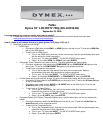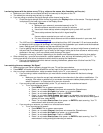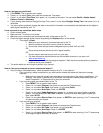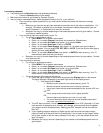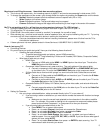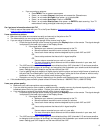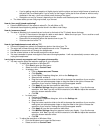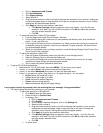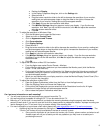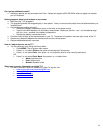
• If you are using an antenna:
o Press MENU. The on-screen menu opens.
o Press < or > to select Channel, then press v to access the Channel menu.
o Press ^ or v to select Air/Cable, then press < or > to select Air.
o Press ^ or v to select Auto Scan. Press > or ENTER.
o Press ^ or v to select Start to Scan, then press > or ENTER to start scanning. Your TV
memorizes all analog and digital channels you receive.
Can I get more information about this TV?
o Refer to manual that came with your TV or the Dynex Website: dynexproducts.com/pc-680-23-dynex-32-720p-flat-
panel-lcd-hdtv-matte-black.aspx
I have sound but no picture.
o Make sure the cables are connected correctly and securely to the jacks on the TV.
o The video cable(s) you are using may be bad, try a new set.
o If you are using an antenna, the signal strength of the channel may be low.
Check the signal strength of the channel by pressing the Display button on the remote. The signal strength
is displayed in the lower right corner of the Display screen.
• If the signal level is Weak:
o Make sure your antenna is connected securely to the TV.
o Move the antenna around the room or close to a window.
o Use a basic indoor set-top antenna designed to pick up both VHF and UHF.
OR
Use a set-top antenna that has a built-in signal amplifier.
OR
Use an antenna mounted on your roof or in your attic.
o For more information about antennas and the available channels in your area, visit
www.antennaweb.org
The UHF band (channels 14 and higher) is more directional than VHF (channels 2-13) and more sensitive
to obstacles (such as trees, tall buildings, and mountains) that lie between your antenna and the broadcast
tower. Getting good UHF reception can be more difficult than VHF.
If you're getting marginal reception of digital signals, both the picture and sound might freeze or break up to
the point that it's not watchable. If you're really on the fringes—either too far from a tower or with too many
obstacles in the way—you'll see a black screen that says "No signal."
Reception can vary by channel, depending on the location and broadcast power level of a given station.
o If this troubleshooting does not work, please contact In-Home Service at 1-888-BEST BUY (1-888-237-8289).
I have poor picture quality.
o Make sure your cable connections are connected securely.
o If you are receiving service from a cable or satellite provider, reception can vary by channel depending on the
broadcast power level of a given station. Contact your cable or satellite provider.
o If you are using an antenna, the signal strength of the channel may be low.
Check the signal strength of the channel by pressing the Display button on the remote. The signal strength
is displayed in the lower right corner of the Display screen.
• If the signal level is Weak:
o Make sure your antenna is connected securely to the TV.
o Move the antenna around the room or close to a window.
o Use a basic indoor set-top antenna designed to pick up both VHF and UHF.
OR
Use a set-top antenna that has a built-in signal amplifier.
OR
Use an antenna mounted on your roof or in your attic.
o For more information about antennas and the available channels in your area, visit
www.antennaweb.org
The UHF band (channels 14 and higher) is more directional than VHF (channels 2-13) and more sensitive
to obstacles (such as trees, tall buildings, and mountains) that lie between your antenna and the broadcast
tower. Getting good UHF reception can be more difficult than VHF.
6



